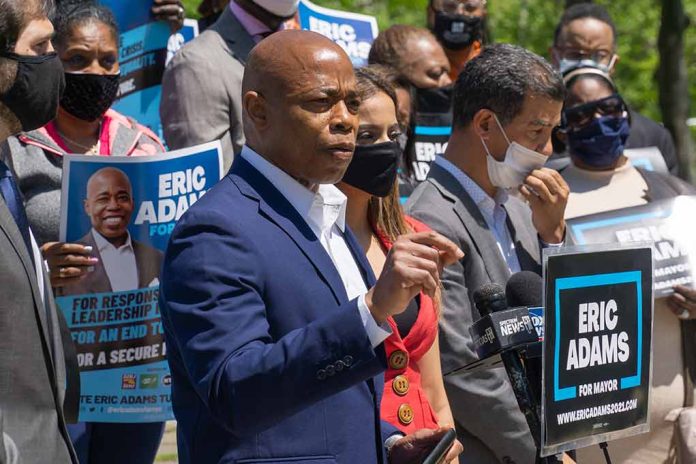
New York City Mayor Eric Adams finds himself at the center of a legal storm as federal prosecutors move to drop corruption charges against him, raising questions about prosecutorial power and political influence.
Key Takeaways
- Federal prosecutors have requested to drop the Justice Department’s case against NYC Mayor Eric Adams.
- Several prosecutors resigned rather than proceed with charges, citing misuse of prosecutorial power.
- The deal to dismiss charges is not a typical plea bargain, as Adams hasn’t pleaded guilty to any offense.
- Adams has agreed to cooperate with federal immigration authorities as part of the deal.
- The case dismissal is pending a federal judge’s approval.
Unprecedented Legal Maneuver Raises Eyebrows
In an unexpected turn of events, the U.S. Department of Justice has moved to dismiss corruption charges against New York City Mayor Eric Adams. This decision has sent shockwaves through the legal community and political circles, with several prosecutors resigning in protest. The case, which involved allegations of bribery and fraud, has taken an unusual trajectory that deviates from standard legal procedures.
The motion to drop the charges comes after intense scrutiny and debate within the Justice Department. Hagan Scotten, a federal prosecutor who resigned over the decision, criticized DOJ officials for what he perceived as an abuse of power. In a scathing letter, Scotten stated, “Any assistant U.S. attorney would know that our laws and traditions do not allow using the prosecutorial power to influence other citizens, much less elected officials, in this way.”
A Deal Unlike Any Other
What sets this case apart is the nature of the agreement between Adams and federal prosecutors. Unlike typical plea bargains where defendants admit guilt to lesser charges, Adams has not pleaded guilty to any offense. Instead, the charges are set to be dismissed without prejudice, meaning they could potentially be reinstated if Adams fails to comply with the terms of the agreement.
Mayor Adams’ Response and Implications
Mayor Adams has vehemently denied any wrongdoing throughout the ordeal. In a public statement, he asserted, “I want to be crystal clear with New Yorkers: I never offered — nor did anyone offer on my behalf — any trade of my authority as your mayor for an end to my case. Never.”
However, the terms of the agreement raise concerns about the potential influence on Adams’ governance. As part of the deal, Adams has agreed to cooperate with federal Immigration and Customs Enforcement (ICE) agents, specifically allowing them to interview detainees at Rikers Island. This cooperation requirement has sparked debate about the appropriateness of tying personal legal matters to official duties.
Political Ramifications and Future Uncertainties
The dismissal of charges, if approved by a federal judge, could have significant implications for Adams’ political future. While it removes the immediate threat of prosecution, the unusual nature of the deal and the lingering possibility of renewed charges has cast a shadow over his administration.
The controversy surrounding this case underscores the complex interplay between law enforcement, politics, and governance. As the dust settles, New Yorkers and political observers alike will be watching closely to see how this unprecedented legal maneuver affects the leadership of America’s largest city and the broader landscape of political accountability.









